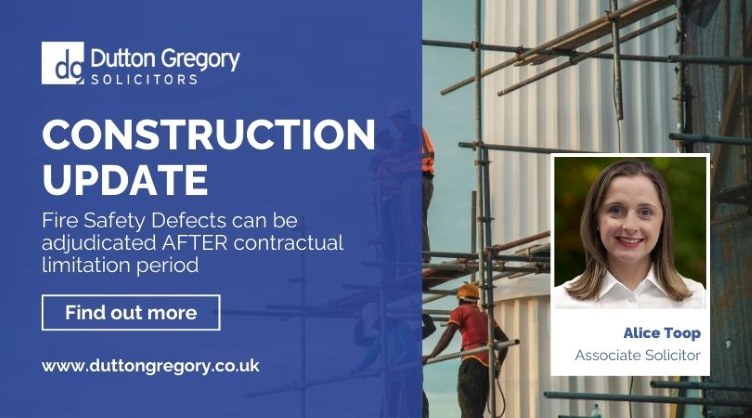AJUDICATION UPDATE: Fire Safety Defects can be adjudicated AFTER contractual limitation period.
Alice Toop, an Associate Solicitor specialising in Construction Disputes, considers the recent significant TCC decision in BDW Trading v Ardmore Construction, which decided that a party to a construction contract, who can bring an adjudication at any time, may do so after the usual contractual limitation periods expire.
A significant judgment relating to building safety was handed down by the Technology and Construction Court (TCC) last month, which has huge implications for the construction industry.
Background
Following the introduction of the Building Safety Act in 2022 (“BSA”), there has been uncertainty in the construction industry about the effect of this legislation and how it should be interpreted against well-established principles.
One area of uncertainty has been how the retrospective extended limitation periods under the BSA for claims under the Defective Premises Act 1972 (“DPA”) will be determined and whether such claims can be capable of being referred to adjudication (instead of the usual Court litigation process).
Adjudication is a compulsory dispute resolution process for the construction industry, used to resolve any dispute relating to a construction contract. In comparison to lengthy and expensive litigation in Court proceedings, adjudication is a quick and cost-effective means of resolving construction disputes.
The BDW Trading v Ardmore Construction case
The dispute related to the development of an apartment block known as Crown Heights in Hampshire.
Under a JCT building contract, Ardmore (the Defendant) constructed the Crown Heights development. Practical completion happened by June 2004.
BDW (the Claimant) benefitted from a post-practical completion assignment of the JCT building contract.
Almost 20 years’ after practical completion, on 21 March 2024 BDW referred a dispute to adjudication relating to fire safety defects which were discovered in the Crown Heights development.
BDW’s claim consisted of 2 alternative grounds:
- Ardmore had breached the JCT building contract and BDW could rely on an extended limitation period as Ardmore had deliberately concealed its omission of cavity barriers in the development.
- Ardmore had breached the DPA.
The adjudicator’s decision was released in September 2024, concluding that:
- Ardmore had breached its duties under the JCT building contract.
- BDW’s claim was not time barred as the adjudicator found that Ardmore had, indeed, deliberately concealed missing cavity barriers during the construction of the development.
- Ardmore was liable under the DPA.
- Ardmore had to pay c.£14.4m in damages for a cladding replacement scheme.
BDW applied to the TCC to enforce the adjudicator’s decision.
During those proceedings, Ardmore raised four grounds on which it sought to resist enforcement of the adjudicator’s decision, all of which were rejected by the TCC:
- The dispute had not crystallised before it was referred to adjudication
The judge considered the case law and applied them to the facts. The adjudication notice was sent in March 2024 and BDW had previously sent a letter of claim to Ardmore in July 2022. On the facts, the judge held that the dispute had crystallised and so could be referred to adjudication.
- The adjudicator did not have jurisdiction to determine BDW’s claim for breach of the DPA
Ardmore argued that the adjudication clause in the JCT building contract, which provided for adjudication of any dispute or difference which “arises under this Contract”, did not allow the DPA claim to be referred to adjudication.
The judge carried out a detailed analysis of the relevant case law before rejecting Ardmore’s argument and concluding that the adjudicator did have jurisdiction to deal with the DPA 1972 claim.
- The adjudication breached the rules of natural justice and was inherently unfair due to the inequality of arms in terms of documentation held by the parties, due to the passage of time (approx. 20 years) since practical completion.
The judge found that despite this being a stale claim, Ardmore was not entitled to "any additional degree of latitude" and there was no inequity between the parties in terms of documents.
The Judge also gave guidance on the relevance of the passage of time to allegations of unfairness, as follows:
“Ardmore also accepts that the mere passage of time is not in itself enough to create unfairness and it is clear from the authorities to which I have referred that adjudication provisions may be relied upon “at any time”. Nevertheless, in principle it must be the case that the longer the period since the works in respect of which complaint is made, the more careful the court will need to be in scrutinising any complaint of unfairness …”.
- The adjudicator had failed to consider their material defence to the allegation of deliberate concealment.
The judge rejected this argument because (amongst other reasons) the issue alleged by Ardmore to have been overlooked by the adjudicator had not been included by Ardmore in a list of issues which it had prepared for resolution by the adjudicator.
Commentary
The judgment is the first to consider whether an adjudicator has jurisdiction to determine a DPA claim after the usual contractual limitation periods have expired.
The decision is hugely significant as it confirms that decades-old building safety disputes can be resolved through the adjudication process.
Alice is not particularly surprised by the TCC’s decision in this case, because the adjudication process is strongly supported by the Courts (as it is a quick and cost-effective means of resolving construction disputes) and they almost always enforce an adjudicator’s decision. Contesting the enforcement of adjudicator’s decisions is extremely difficult.
Whilst this is a significant and important decision for the construction industry, it is not necessarily the end of the road because adjudication decisions are only binding on an interim basis until the dispute is finally determined by litigation, by arbitration or by agreement. Some recent press coverage indicates that Ardmore is preparing to arbitrate the dispute. In addition, a Supreme Court decision is also due this year on some points which touch on this case.








